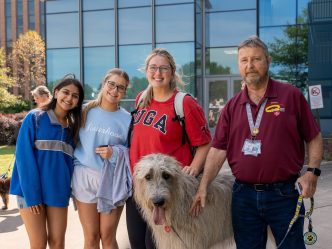Every year, as many as 1,100 college students die by suicide. Most of these students were not in treatment at the time, according to the Jed Foundation, an organization that works to promote emotional health and prevent suicide among college and university students.
In November, 14 Augusta staff members were certified as instructors for QPR Suicide Prevention Gatekeeper Training. Prior to this training, the university did not have a formalized suicide prevention program, but QPR certification marks the beginnings of a formalized prevention program.
QPR stands for question, persuade and refer. It was developed on the fundamentals of CPR. One of the principles of CPR is that if one in four people is trained to detect the signs that a person is not breathing, then the odds are high that someone will be available to help. When this idea is applied in QPR training, the focus is on preventing a mental health crisis rather than a physical emergency.
“I’m usually the first person to meet with students when we get a report that they may be in distress,” said Gina Thurman, assistant dean of student life. “So, I was very interested in attending the training.”
After completing the 45-minute training, Augusta faculty and staff will be able to detect signs of a person being distressed, depressed or at risk for suicide. They should know how to ask appropriate questions of that person, be able to persuade that person to get help and refer the individual to a place where they can get help.
The staff members currently certified are authorized to train others in QPR, and they’re planning to begin hosting QPR training sessions in the spring. Dr. Mark Patishnock, director of the Counseling Center and a licensed psychologist, has asked each of those 14 Augusta faculty and staff members to hold two presentations next semester.
“If each one of us has four presentations a year, two a semester, in which 25 people attend, that’s 1,400 people who get trained in one year,” he said. “It takes a small body of people and a small commitment of time. You can reach a lot of people with a basic message, in a small period of time, with basic resources.”
The goal is to train as much of the Augusta campus community as possible. The training is designed for friends, family, faculty and staff to intervene, since they are often the first line of defense.
“If we want to prevent suicide, students struggling with mental health issues are far more likely to see other students or faculty and staff than they are to see a licensed mental health professional,” Patishnock said. “It’s very rare for someone who commits suicide to have been actively in treatment. So, if we want to help people, we’ve got to go outside of the Counseling Center.”
QPR training offers suggestions on how to ask students if they’re suicidal. It also includes specific recommendations for referrals and follow-ups. QPR also helps people understand what percentage of students are impacted by suicide and provides information about being able to understand verbal, behavioral and situational cues that indicate someone might be at increased.
“It’s actually basic information that anyone can use, even if you don’t have a mental health background,” Thurman said. “We’d like to get as many people as possible trained.”
If you’re interested in attending a training session or learning more about QPR, visit the Counseling Center website at http://www.gru.edu/admin/counseling/ or contact Dr. Patishnock at MPATISHNOCK@gru.edu.
 Augusta University
Augusta University




